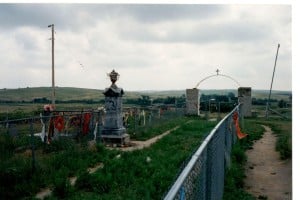Use of Confederate Flag in California Painting and Klan Imagery in Massachusetts Leads to Removal of Controversial Works
Two recent interventions by public authorities to remove controversial works of art underscore that, like last year’s Leonard Peltier painting dispute, the proper application of the First Amendment remains more elusive than it should. In California, a state law prohibiting the display of the Confederate flag led to the removal of a specific painting from an exhibition, while north of Boston at Salem State University, a painting depicting figures in Ku Klux Klan robes was shut down entirely. Together, these examples provide a useful of what state authorities can, and cannot do with regards to messages they find offensive. The difference is very important.
Read More
Topics:
Ku Klux Klan,
The Boston Globe,
Confederate Flag,
First Amendment,
Leonard Peltier,
Salem State University,
Timothy Desmond,
Civil War,
Garry Harley,
Fresno,
State of the Union

An exhibition in Washington (state) that included art by a number of Native Americans, including Leonard Peltier, has provoked an outcry that may have Constitutional dimensions that went unconsidered. Peltier is a controversial Native American activist who was convicted of murdering in 1975 two FBI agents, Jack R. Coler and Ronald A. Williams. His conviction has long been a Rorschach Test for responses to Native American activism and the federal government’s response—Peltier has strenuously insisted he is innocent, and the FBI has adamantly maintained he was properly convicted. This has now raised its head in the realm of the public display of art, and whether the government may, or should discriminate among artists. After an outcry about the inclusion of Peltier’s art by a number of current and retired law enforcement officials, the Washington Department of Labor and Industries has announced that it will remove Peltier’s paintings from the display that marked Native American Indian Heritage Month there, and has apologized. Yet regardless of one’s opinion if Peltier’s guilt or innocence, the government has stepped in a First Amendment quagmire when it made a public forum available for expression and then removed the expressive work of only one person because of who he is. The First Amendment, after all, acts to protect expression regardless of popularity, indeed, particularly so. It is hard to argue that his work was removed for any of the reasons that courts generally permit restrictions on speech in the various kinds of public forums. It remains to be seen whether Peltier will object on those grounds.
Read More
Topics:
Ray Lauer,
Wounded Knee,
Ronald A. Williams,
North Dakota,
Florida,
South Dakota,
American Indian Movement,
Native American Indian Heritage Month,
Pine Ridge Reservation,
Native American,
Coleman Federal Correctional Facility Coleman,
National Retired Agents Association,
Washington Department of Labor and Industries,
First Amendment,
Guardians of the Oglala Nation. GOON,
Jack R. Coler,
AIM,
Leonard Peltier,
Lakota Sioux Chippewa




